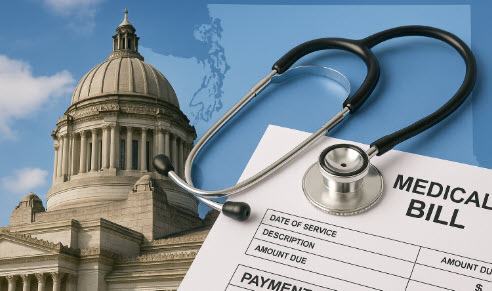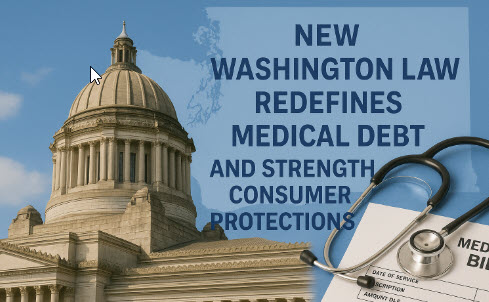As of October 1, 2024, significant reforms related to medical debt collection under the Minnesota Debt Fairness Act are set to take effect. Here’s an overview of the critical components and how they will impact healthcare providers, debt collectors, and consumers.
Key Sections Taking Effect in October
- Publicly Available Medical Debt Collection Policies (Section 26 [62J.806]) This section mandates that healthcare providers must make their medical debt collection policies publicly accessible. It also details the procedures for communicating with patients regarding medical debt, including referrals to collection agencies and clarifying when a debt is considered uncollectible or resolved.
- Definition and Oversight of Medical Debt (Sections 126.14 – 131.9) These provisions define what qualifies as medical debt, which includes any debt charged to a credit card. Enforcement of these definitions falls under the jurisdiction of the state attorney general.
- Eradication of Spousal Liability (Sections 134.1-144.9) One of the critical changes is that a spouse will no longer be held liable for the medical debts of their partner. This section also outlines garnishment provisions.
- Prohibition on Reporting Medical Debt to Credit Reporting Agencies Starting October 1, 2024, collecting parties are prohibited from reporting medical debt to credit reporting agencies (CRAs). This prohibition applies to debt collection agencies and debt buyers licensed under Chapter 332.
Implications for Debt Collection and Healthcare Providers
The new law expands the definition of a “collecting party” and eliminates spousal liability for medical debt. It also brings complexities to medical debt reporting, making it crucial for healthcare providers and debt collectors to update their policies and practices.
Agencies working with healthcare providers in Minnesota are advised to review their procedures, particularly regarding spousal communications under the Fair Debt Collection Practices Act. It’s essential to ensure that account notices are sent to the appropriate individuals, especially if a collection lawsuit is being pursued.
Prohibited Practices and Required Disclosures
As of October 1, 2024, Section 78 [332C.02] (18) outlines prohibited practices under the Minnesota Debt Fairness Act. Agencies contacting Minnesota consumers by mail to collect medical debt must now include the Minnesota Attorney General’s general telephone number and inform consumers of their right to hire an attorney for representation.
Additionally, healthcare providers should take note of Section 27 [62J.807], which prohibits denying medically necessary treatment or services to a patient or their family due to outstanding medical debt. However, providers can require patients to enroll in a payment plan for the outstanding debt as a condition for receiving necessary care.
Credit Reporting Restrictions
The act explicitly prohibits CRAs from including medical debt information in consumer reports. These restrictions apply to medical care, treatments, services, devices, medicines, or procedures related to a person’s physical or mental health. Debt collection agencies must carefully review their credit reporting policies, especially when dealing with medical debt owed by Minnesota residents but originating outside the state.
Upcoming Changes in 2025
Out-of-State Licensure Reciprocity (Effective January 1, 2025) – Section 332.3351 introduces reciprocity for out-of-state collection agencies if a reciprocal licensing agreement exists between Minnesota and the agency’s home state.
Wage Garnishment Limitations (Effective April 1, 2025) – Section 571.922 introduces limitations on wage garnishment. An attorney general working group, including industry stakeholders, is tasked with updating garnishment forms ahead of this change
Looking Ahead
The legislative landscape in Minnesota may evolve in the coming year, with an equal split between parties in the state Senate and a narrow Democratic majority in the House of Representatives. This could influence further amendments or clarifications to the Debt Fairness Act.
Stay informed on these changes, as they will have a lasting impact on medical debt collection practices in Minnesota. It’s essential for all involved to review their policies and stay compliant with the new laws.

Author: Jennifer Evancic
Jennifer.Evancic@ResourceManagement.com
Jennifer Evancic is a third-party auditor valued by creditors and large organizations for her knowledge in call monitoring within the collections industry. With meticulous attention to detail and a firm grasp of regulatory requirements, she ensures compliance with clients’ criteria and state and federal regulations.
Jennifer audits collections calls, ensuring they meet client-specific criteria and comply with regulations, providing valuable insights and maintaining industry standards.
Beyond her auditing responsibilities, Jennifer takes the lead in organizing and facilitating monthly call calibrations. These sessions serve as a collaborative forum where clients and their vendors come together to discuss call monitoring results and address any findings or areas for improvement. Jennifer’s guidance fosters open communication and ensures alignment between clients and vendors, driving continuous improvement in collections practices.
Jennifer stays up-to-date with compliance and industry best practices by participating regularly in peer meetings, regulatory updates and industry webinars. This keeps her informed about emerging issues and ensures she remains a knowledgeable leader in collections compliance.
Sign Up for the Twice Monthly Newsletter
Just enter your email address at the top orange bar at:
Collection Compliance Experts – “The Power of Expertise: Oversight Perfected”
It’s that easy! Twice a month – we provide blog updates and Resources for the Collection and Industry Professional.
Your email is just for this newsletter. We never sell your information. No fee. Opt-out at any time.





